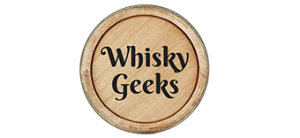Latest News
Kitchen Chat and more…
Kitchen Chat and more…
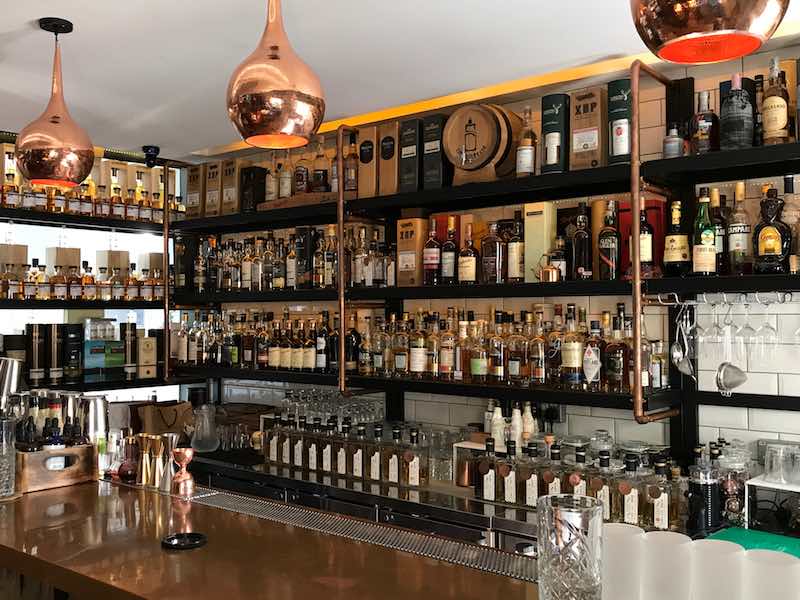
Picture Credits: WhiskyGeeks
The Single Cask (TSC) is a boutique whisky bar located at the charming Caldwell House in CHIJMES. Almost hidden by a spiral staircase right outside its doors, this cosy place is not your typical whisky bar. TSC dedicates itself to whisky lovers in Singapore and around the world with the motto of “by enthusiast, for enthusiast”.
Ben Curtis founded TSC as a brand in 2010 with only 4 casks. He spent the next 5 years looking for the right casks and distilleries for his bar. TSC opened its first bar in September 2015 in Singapore. The second bar opened in March 2017 in Stamford, Lincolnshire, United Kingdom.
Despite its short history, TSC won the hearts of many whisky enthusiasts in Singapore. Returning patrons walk through their doors on a regular basis. The bar stocks a range of more than 350 different labels. Most of these labels are independently bottled and drawn from a single cask. The brand also has its own range of independent bottling which showcases single cask expressions from Scotland, England, USA and Guyana.
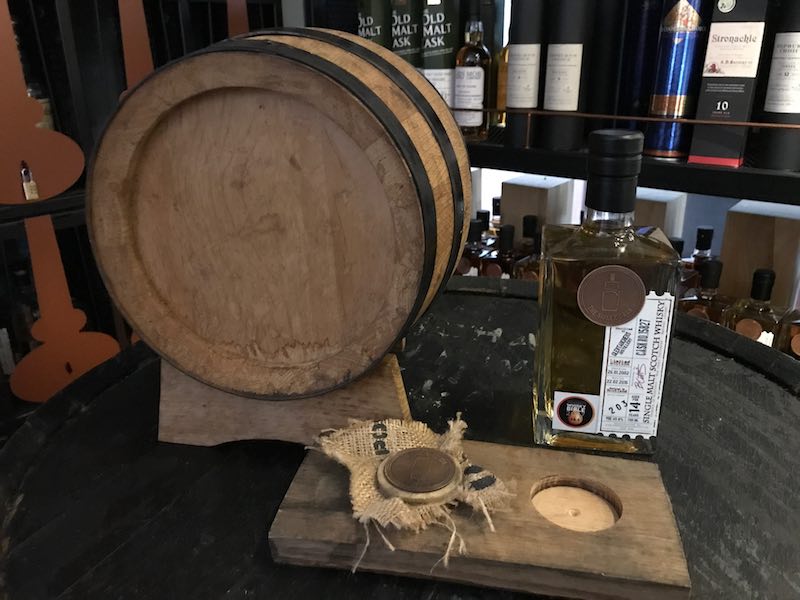
Picture Credits: WhiskyGeeks
TSC specialises in single cask Scotch whisky and commits itself to source for only the best. The company supports and represents a number of family owned distilleries and independent bottlers. As an independent bottler, TSC takes care to select whisky casks that are unique and interesting. These casks are then bottled under their own whisky label “The Single Cask”. Patrons visiting the bar can have a dram of these beautiful expressions. If they like it, visitors can buy a bottle to bring home for their own private enjoyment.
Ben Curtis: As you already know, Ben Curtis is the boss of TSC. He is the “whisky daddy” as he is the oldest in the team and knows the most about whisky and spirits. As a man who is in this trade for more than 2 decades, he has rightly earned the rights to be a “daddy” of whisky.
Brendan Pillai: Brendan is the bar manager of TSC Singapore. As a fellow whisky geek, he is considered the resident expert at the Singapore bar. Brendan also shares his knowledge through his blog, WhiskyMate.
TSC inclines towards independent bottlers and lesser-known distilleries due to their own experiences as an independent bottler. Within that impressive collection of more than 350 different labels, you can expect to find rare and beautiful expressions that are not found elsewhere.
Besides whisky, TSC offers a range of different spirits and cocktails to satisfy patrons who are not inclined towards whisky. Expect amazing cocktails from their “mixologist” as he creates cocktails suited for your palate.
Besides beautiful expression of whisky, TSC also hosts special events and masterclasses. It is also the first Whisky Ambassador accredited venue in Singapore. Patrons interested to host whisky tasting sessions for their friends or business associates are also welcomed. In addition, TSC offers whisky tasting sessions for corporates team building and networking events. Flexible arrangements and packages are available.
TSC Singapore is located at Chijmes Caldwell House, #01-25, 30 Victoria Street, Singapore 187996
TSC Stamford is located at 16 St Mary’s Hill, Stamford, Lincs PE9 2HN
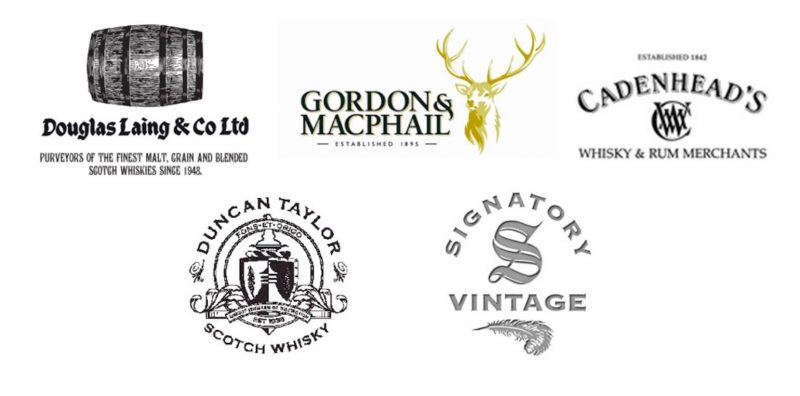
We have touched the tip of the ice berg regarding independent bottlers (IBs) in our previous post. In this post, we will share the top 5 IBs whose bottles are found in Asia, particularly Singapore.
Gordon & MacPhail is founded in 1895 by James Gordon and John Alexander Macphail. Originally a well-known grocer, the company imported all kinds of groceries. That included whisky. As the founders grew to like whisky, they started buying malt whisky by the barrels. They inclined towards Speyside’s single malts and today have a large collection of these whiskies.
John Urquhart joined James and John Alexander in their early days as an apprentice. The business passed into the hands of Urquhart and his family later on. Today, the company is still helmed by the Urquhart family.
Gordon & MacPhail occupies the original premises in Elgin, Scotland since 1895. Today, it is one of the largest independent bottlers in Scotland. They have over 300 own bottlings in their catalogue at any one time. In 1993, they also bought the Benromach distillery. The distillery closed for renovation for 5 years and reopened in 1998, where they continue to produce quality whisky for the world.
The range of whiskies is wide and includes Connoisseurs Choice, The MacPhail’s Collection and Cask Strength.
Douglas Laing & Co Ltd is a Glasglow based company founded in 1948 by Frederick Douglas Laing. Unlike Gordon & MacPhail, Douglas Laing started out as an IB directly. The post-war era was a good time for business and the company grew rapidly. The business passed down to his two sons, Fred and Stewart, who continue to manage the business well. The company is one of the largest independent bottlers today.
In 2013, Stewart decided to start his own company called Hunter Laing and the two brother parted ways. Nonetheless, Douglas Laing continues to produce high quality whiskies despite challenges in the company with Stewart leaving.
Some of the popular ranges of whiskies from Douglas Laing includes the Old Particular range of single malt and single grain whiskies as well as blended malt such as Big Peat and the King of Scots.
WM Cadenhead’s is a well-known independent bottler but it did not start that way. It was founded by George Duncan in 1842 as a vintner and distilling agency in Aberdeen. He invited his brother-in-law, William Cadenhead, to join him after a decade of flourishing business. 6 years after Cadenhead joined, Duncan passed away, leaving the vintner to Cadenhead. He promptly changed the company’s name and continued to build the business.
Cadenhead passed the vintner to his nephew, Robert Duthie, when he died. Duthie was the one who developed the company into the independent bottler that we know today. In an attempt to move away from his uncle’s business model, Duthie started vatting the variety of malts he had to create exceptional blended malts like the popular Heilanman and deluxe Putachieside. He also started the slogan “By Test the Best”.
Duthie died in an accident in 1931, leaving the company to his two sisters. They have no idea how to run the business, so they left it in the hands of long-time employee, Ann Oliver. Unfortunately, Oliver was unable to grow the company but instead left it in such a bad state that they ran a “fire sales” of spirits at the auction house of Christie’s in 1972. Ironically, it cleared all their debts and added a 6-figure profit to the company. The sisters decided to sell the company to J. & A. Mitchell and Co., the owner of Springbank in Campbeltown in the same year. It moved to Campbeltown where it continues to produce quality independent bottling today.
Duncan Taylor shared a similar history to most of the independent bottlers above. It was founded in 1938 as a cask broker and trading company. Due to its strong ties with the distilleries they worked with, Duncan Taylor began to bring their own casks to buy new make spirits from their distilleries friends. This resulted in Duncan Taylor holding on to rare whiskies from closed distilleries today.
Euan Shand bought Duncan Taylor in 2001 and moved the company to his hometown of Huntly, Scotland. He also changed the business completely, forsaking its history as a cask broker. Euan’s experience in the industry makes him the perfect guy to utilise the whisky vault that Duncan Taylor owns and he began the company’s new journey as an independent bottler.
Some of the popular ranges of whiskies include Black Bull, The Octave and The Rarest.
The last bottler on our list is relatively young but equally strong. Signatory Vintage is established in 1988 by Andrew Symington and his brother in Edinburgh. As a late bloomer, the company adopts a vigorous release policy so consumers can easily find 50 available different single malt expressions at any one time. Despite the bigger amount released, the quality is never compromised and the company grew by leaps and bounce.
Signatory Vintage was threatened in the early 2000s due to the crisis of independent bottlers where distilleries started to mistrust them. In an attempt to overcome the threat, Signatory Vintage bought Edradour distillery in 2002 and moved its operation to Perthshire, next to the distillery. Today, the company is producing not only quality independent bottles but also releasing single malt whisky under the Edradour brand.
The popular ranges of whiskies from Signatory Vintage include the un-chill filtered collection, the cask strength collection and the single grain collection.
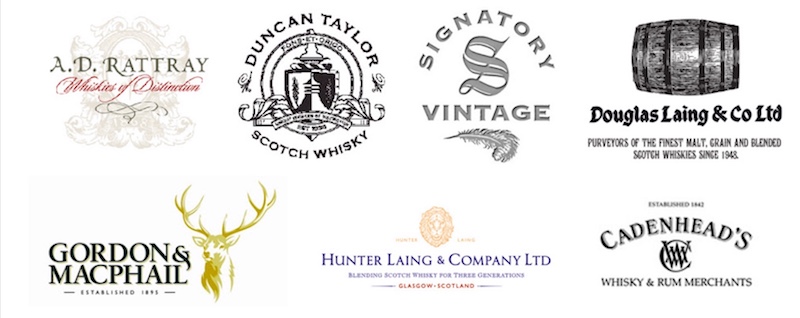
Picture Credits: http://whiskyforeveryone.blogspot.sg
Much talks about independent bottlers have been around for a while. Almost everyone has an opinion about independent bottlers. Some say that they are fantastic for the market, some not so. Others say that independent bottlers make inferior whiskies, while some appreciate these whiskies more. Despite the mixed opinions, indepedent bottlers are rising to fame. Why is that so?
The appeal of independent bottlers (IBs) is simply the fact that they expand the whisky market. You can call them an industry disruptor if you will, because they bring a larger selection of whisky to the world. IBs do one of these two things – they buy new spirits from distilleries and mature them in their own casks, or they buy and trade already matured whisky in barrels. If the IBs decide on new spirits, they can choose to store the barrels/casks in their own warehouse, or leave them in the distillery or a shared warehouse.
The last decade has seen the rise of many new independent bottlers, especially in Scotland. There is also a trend for popular whisky shops to bottle their own whiskies. For example, The Single Cask, La Maison du Whisky, The Auld Alliance, etc. These shops are found in Singapore and each of them have their own labels. These new independent bottlers often confuse people, because they are not well-known to the public. The doubt is strong regarding how good they are. Oftentimes, they need to prove their own worth but they are doing it!
The first known independent bottler in Scotland appears to be Gordon & MacPhail from Elgin. Originally a well-known grocery company, it decided to buy malt whisky in casks and to bottle it with their own labels. As they started in 1895, they have a large stock of malt whisky casks that are worth a fortune in current time. Between 1895 to 1980s, there were many other IBs, but most of them closed down due to the 2 world wars and major economic upheavels.
In the 1980s, Signatory Vintage Ltd entered the market. The Symington brothers marked the Scotch single malt as their goal, and they make it their mission to change the Scotch single malt market. Due to their diligence and hard work, they transformed the whole market in 20 years, achieving high success.
Up until 2001, there were many dubious new IBs which entered the market and gave it a bad name. This pretty much caused suspicions and doubts from both big player distilleries and consumers alike. Restrictions were placed by the big boys. Distilleries such as Glenmorangie and Glenfarclas forbid IBs to use their names. Others like Diageo, stopped selling casks to IBs. Consumers boycotted certain IBs which are producing inferior products. Some stopped trying whiskies from IBs completely. The sincere IBs were in trouble. With no good quality casks to be bought, they were in danger of drying up.
In order to survive, the IBs bought distilleries themselves. Gordon & MacPhail took over the Benromach distillery. Murray McDavid bought Bruichladdich while Ian MacLeod took the helms at Glengoyne. Signatory Vintage waited a while before buying Edradour distillery. With the big IBs running their own distilleries, expectations of independent bottling naturally raise as well, creating this class of high quality independent whiskies that we get today.
Nobody knows what the future may bring. Nonetheless, we foresee mergers in the short to medium term for the IBs. For the long run, they will need to come up with better business strategies. One viable option is to set up new distilleries of their own. Some examples of such include the Isle of Arran and Kilchoman. The easiest way to do this is to buy a distillery that is closing down. However, this, in itself, is a challenge. Well-known distilleries are expensive while cheap distilleries have lesser potential. How can one decide which to buy?
Nonetheless, the future is not totally bleak for the IBs as the market is taking notice. As long as they continue to finetune their business models and produce good whiskies, the consumers will help them to survive for the next 100 years or more.
11311 Harry Hines Blvd
Dallas, TX, United States
(555) 389 976
dallas@enfold-restaurant.com
